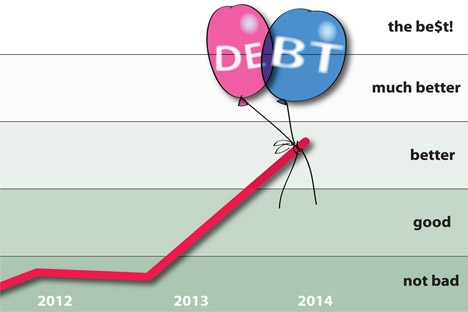Debt growth currently well below risk levels

Drawing by Niyaz Karim. Click to enlarge the image.
While Russia’s budget depends on oil and gas revenues for just under 50 percent of the total (a figure that has been steadily falling as tax revenues from individuals and other industries have been growing), extractive industries have contributed almost nothing to GDP growth in six years.
Retail sales in Russia expanded by almost 7 percent, year-on-year, through the first half of 2012, fueled by an 11.3 percent gain in real wages and an increase of 2.7 percent in real disposable incomes. There has also been a 40 percent rise in retail lending by the banks and other finance organizations over the past 18 months.
Related:
Prime Minister says Russian economy is doing just fine
The obvious questions are whether this is sustainable, and are we seeing a bubble effect developing in the retail debt market?
The answer to the first question is that while the pace of growth in the retail sector is likely to ease back a little, i.e. as the base effect grows, conditions are in place to sustain meaningful growth for the foreseeable future. Russia’s federal budget spending has moved more toward social spending, and the government is also prioritizing the boosting of wages in the state-funded sector.
In addition, the post-Soviet generation is now becoming a bigger part of the workforce and has Western-focused spending habits and lifestyle ambitions. Previous concerns about demographic deterioration have also now been resolved as the birth rate increases, people live healthier lives and immigration has reversed.
This year, Russia will see a net increase in the population for the first time since the early 1990s, and projections have been revised to forecast population growth in the coming decades.
In terms of debt expansion there is no issue here either, for while the pace of growth is very high in absolute terms, it comes off a very low starting point. Russian households are among the least leveraged in the world and, as a legacy of the Soviet era, the country has one of the highest levels of un-mortgaged property ownership in the world. So there is plenty of scope for further debt expansion without approaching risk levels.
Of course, that pace of growth does have implications for the banks. To fund the consumer-driven growth, the banking sector will have to regularly tap markets for new capital to remain within the Central Bank’s stringent capital adequacy guidelines. But, so long as the capital asked for is to fund continued growth, there is never a problem with investors.
The banking sector provides a sort of proxy for the expanding domestic economy and the fast-growing consumer sectors, which can otherwise be difficult for the biggest investment funds to access. Only about 17 percent of the value of Russia’s stock market represents companies in the domestic sectors, while an additional 12 percent is represented by banks. The bulk of the stock market is currently accounted for by the extractive industries and the big state corporations.
Investors, who can ignore the short-term volatility that has afflicted all markets since the 2008 crisis started, still have an attractive entry level into Russia’s consumer sectors, i.e., one of the fastest expanding economic themes in the world. Current valuations are typically at a discount to global emerging market peers because of the risk-contagion from the perceived oil threat to the economy. Yet Russian earnings’ growth rates in the consumer sectors remain in the double digits.
Over the coming few years, this I find it really confusing that he’s talked about consumer sectors (plural) all the way through - until you get to here, where it suddenly becomes singular sector in the stock market is set to expand and, in time, the opportunities for investors will become more diverse and more liquid. The valuation of existing listed stocks that offer exposure to Russia’s expanding consumer and other sectors will clearly benefit from that trend.
Chris Weafer is a chief strategist at Sberbank Investment Research.
All rights reserved by Rossiyskaya Gazeta.
Subscribe
to our newsletter!
Get the week's best stories straight to your inbox
